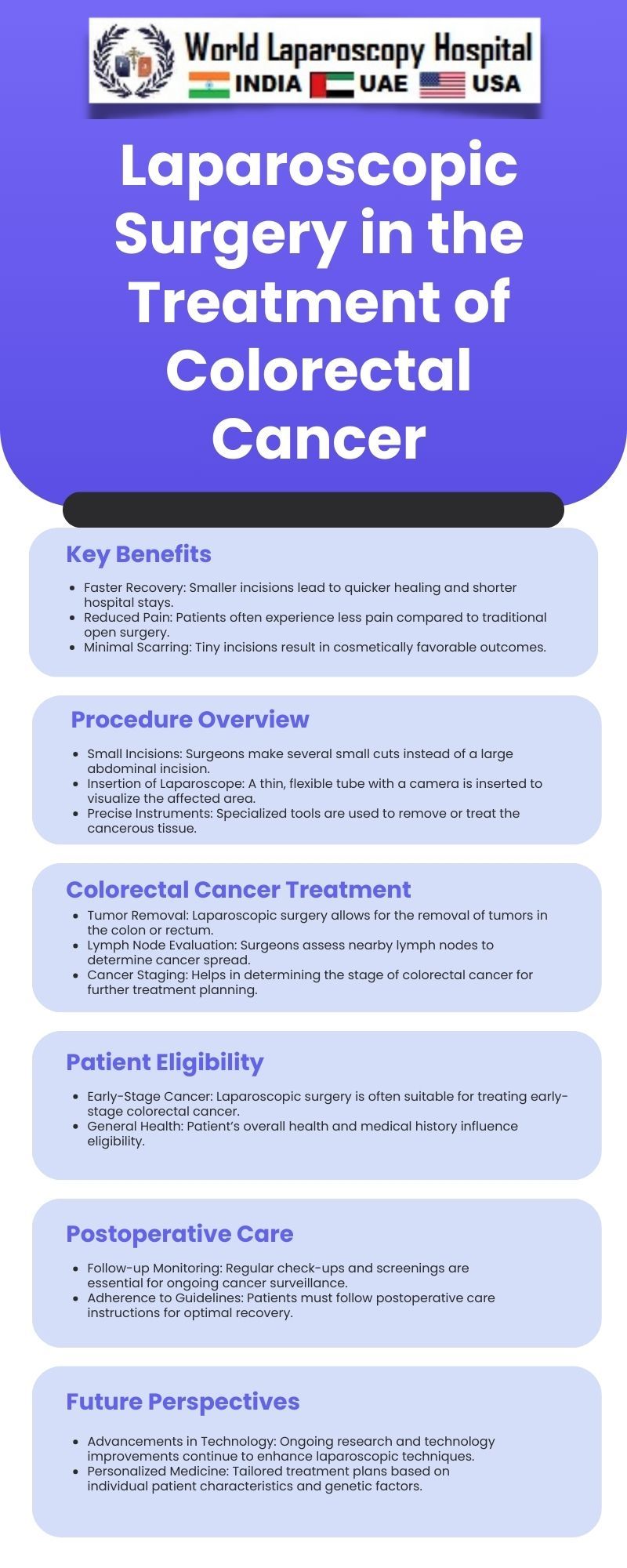Introduction:
Colorectal cancer remains a significant global health challenge, necessitating continuous advancements in treatment modalities. Among these innovations, laparoscopic surgery has emerged as a groundbreaking technique, revolutionizing the landscape of colorectal cancer treatment. This article explores the principles, benefits, and evolving role of laparoscopic surgery in managing colorectal cancer.

Understanding Colorectal Cancer:
Colorectal cancer, comprising cancers of the colon and rectum, is a formidable adversary in the realm of oncology. It is the third most commonly diagnosed cancer worldwide, emphasizing the urgency for effective treatment strategies. Conventional treatments include surgery, chemotherapy, and radiation therapy, each with its own set of challenges and side effects.
The Evolution of Laparoscopic Surgery:
Laparoscopic surgery, also known as minimally invasive surgery, represents a significant departure from traditional open surgeries. The technique involves making small incisions through which a camera and specialized instruments are inserted to perform the procedure. Initially developed for benign conditions, the application of laparoscopy in colorectal cancer surgery has expanded over the years.
Advantages of Laparoscopic Surgery in Colorectal Cancer Treatment:
Reduced Trauma and Quicker Recovery:
Laparoscopic surgery minimizes trauma to the abdominal wall, leading to less postoperative pain and a faster recovery compared to open surgery. Patients typically experience reduced discomfort, allowing for an earlier return to normal activities.
Smaller Incisions and Cosmetic Benefits:
The use of small incisions in laparoscopic procedures not only aids in quicker healing but also offers cosmetic advantages. Smaller scars contribute to improved aesthetics, addressing a concern often expressed by patients undergoing open surgeries.
Shorter Hospital Stays:
Laparoscopic surgery is associated with shorter hospitalization periods, as patients generally recover faster and experience fewer complications. This not only reduces healthcare costs but also enhances overall patient satisfaction.
Improved Visualization:
The laparoscopic approach provides surgeons with a magnified, high-definition view of the surgical site. This enhanced visualization allows for more precise maneuvers, facilitating meticulous dissection and improving surgical outcomes.
Lower Infection Rates:
With smaller incisions and reduced exposure of internal organs, laparoscopic surgery diminishes the risk of postoperative infections. Lower infection rates contribute to a smoother recovery process for colorectal cancer patients.
Applications of Laparoscopic Surgery in Colorectal Cancer:
Colon Resection:
Laparoscopic colon resection involves removing a portion of the colon affected by cancer. This approach has demonstrated efficacy comparable to open surgery, with the added benefits of a quicker recovery and reduced postoperative pain.
Rectal Resection:
The treatment of rectal cancer often requires surgical intervention. Laparoscopic rectal resection enables the removal of the cancerous portion while preserving as much healthy tissue as possible. This approach is associated with improved sphincter function and a lower risk of complications.
Lymph Node Dissection:
Laparoscopic surgery allows for meticulous lymph node dissection, crucial in determining the extent of disease spread. Accurate staging is essential for planning subsequent treatment strategies, such as chemotherapy.
Colostomy Reversal:
Patients with colorectal cancer may undergo colostomy as part of their treatment. Laparoscopic surgery offers a minimally invasive option for colostomy reversal, restoring normal bowel function with reduced postoperative morbidity.
Challenges and Considerations:
While laparoscopic surgery for colorectal cancer has demonstrated numerous advantages, it is essential to acknowledge the challenges and considerations associated with this approach:
Technical Expertise:
Laparoscopic surgery demands specialized skills and expertise. Surgeons must undergo extensive training to master the intricate techniques required for precise and effective procedures.
Cost Considerations:
While laparoscopic surgery may lead to shorter hospital stays and reduced postoperative care, the initial costs associated with equipment and training can be substantial. However, the long-term benefits may outweigh these initial expenses.
Patient Selection:
Not all patients with colorectal cancer may be suitable candidates for laparoscopic surgery. Factors such as tumor size, location, and the patient's overall health must be carefully considered in the decision-making process.
Learning Curve:
The learning curve associated with laparoscopic surgery can impact outcomes during the initial stages of adoption. Surgeons and medical institutions must invest time and resources in training to ensure optimal results.
Future Directions and Technological Innovations:
Robot-Assisted Laparoscopic Surgery:
The integration of robotic systems in laparoscopic colorectal surgery represents a promising avenue for future advancements. Robotic-assisted surgery offers enhanced precision, dexterity, and three-dimensional visualization, further improving surgical outcomes.
Intraoperative Imaging Technologies:
Continued developments in intraoperative imaging technologies, such as fluorescence-guided surgery, provide real-time visualization of tumors and critical structures. This enhances the surgeon's ability to achieve complete tumor removal while minimizing damage to healthy tissue.
Artificial Intelligence in Surgical Planning:
The integration of artificial intelligence (AI) in preoperative planning can optimize surgical strategies based on individual patient characteristics. AI algorithms may assist in tailoring laparoscopic procedures to maximize efficacy and minimize complications.
Personalized Medicine Approaches:
Advancements in understanding the genetic and molecular characteristics of colorectal cancer enable the development of personalized treatment plans. Laparoscopic surgery, in conjunction with targeted therapies, may offer more precise and effective interventions based on the unique profile of each patient's cancer.
Conclusion:
Laparoscopic surgery has undeniably transformed the landscape of colorectal cancer treatment, offering patients a less invasive and more efficient alternative to traditional open surgeries. As technology continues to evolve and surgeons refine their skills, the role of laparoscopic surgery in colorectal cancer is likely to expand further. The ongoing pursuit of innovation, coupled with a commitment to rigorous training and patient-centered care, ensures that laparoscopic surgery will continue to play a pivotal role in the comprehensive management of colorectal cancer.
